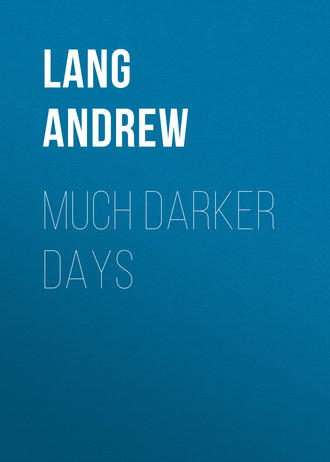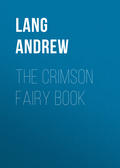
Lang Andrew
Much Darker Days
My mother’s historical knowledge, and the unique example of provident and exhaustive equipment which she cited, reduced me to silence, but did not diminish my anxiety. The delay made me nervous, excited, and chippy.
To-morrow morning we were to start.
To-morrow morning was too late.
With an effort I opened the morning paper – the Morning Post, as it happened – and ran hastily up and down the columns, active exercise having been recommended to me. What cared I for politics, foreign news, or even the sportive intelligence? All I sought for was a paragraph headed ‘Horrible Disclosures,’ or, ‘Awful Death of a Baronet.’ I ran up and down the columns in vain.
No such item of news met my eye. Joyously I rose to go, when my eye fell on the Standard.
Mechanically I opened it.
Those words were written (or so they seemed to me to be written) in letters of fire, though the admirable press at Shoe Lane did not really employ that suitable medium.
‘Horrible Discovery near Roding.’
At once the truth flashed across me. The Morning Post had not contained the intelligence because,
The Government had Boycotted the ‘Morning Post’!
Only journals which more or less supported the Government were permitted to obtain ‘copy’ of such thrilling interest!
And yet they speak of a free press and a free country!
Tearing myself away from these reflections, I bent my mind on the awful paragraph.
‘The melting of the snow has thrown a lurid light on the mysterious disappearance (which up to this moment had attracted no attention) of an eccentric baronet, well known in sporting circles. Yesterday afternoon a gentleman’s groom, wading down the highway, discovered the white hat of a gentleman floating on the muddy stream into which the unparalleled weather and the negligence of the Road Trustees has converted our thoroughfare. An inscription in red ink within the lining leaves no doubt that this article of dress is all that is left of the late Sir Runan Errand. The unfortunate nobleman’s friends have been communicated with. The active and intelligent representative of the local police believes that he is in possession of a clue to the author of the crime. Probably the body of the murdered noble has been carried down by the flooded road to the sea.’
I tore that paper to pieces, and used it to wrap up sandwiches for the journey.
Once again I say, if you cannot feel with me, throw this tale aside. Heaven knows it is a sombre one, and it goes on getting sombrer and sombrer! But probably, by this time, you have either tossed the work away or looked at the end to see what happened to them all.
The morning dawned.
I filled my bag with Hanover pieces, which I thought might come in handy on the Spanish Turf, and packed up three or four yellow, red, green, and blue opera hats, so useful to the adventurous bookmaker.
At this very moment the postman arrived and gave me a letter in a woman’s hand.
I thrust it in my breast pocket recklessly.
The cab rattled away.
At last we were off.
I am sure that no one who could have seen us that morning would have dreamt that out of that party of three – a more than comfortable-looking English matron, a girl whose strange beauty has been sufficiently dwelt upon, and a gentleman in a yellow crush hat and a bookmaker’s bag – two were flying from the hands of justice.
Our appearance was certainly such as to disarm all suspicion.
But appearances are proverbially deceitful. Were ours deceitful enough?
‘But where are we going?’ said my mother, with the short memory of old age.
‘To Paris first, then to Spain, and, if needful, down to Khartoum.’
‘Then you young people will have to go alone. I draw the line at Dongola.’
I glanced at Philippa.
Then for the first time since her malady I saw Philippa blushing! Her long curved eyelashes hid her eyes, which presumably were also pink, but certainly my mother’s broad pleasantry had called a tell-tale blush to the cheek of the young person.
As we drew near Folkestone I remembered the letter, but the sight of the Roding postmark induced me to defer opening it till we should be on board the steamer. When Philippa was battling with the agonies of the voyage, then, undisturbed, I might ascertain what Mrs. Thompson (for it was sure to be Mrs. Thompson) had to say.
We were now on board. Philippa and my mother fled to the depths of the saloon, and I opened the fateful missive. It began without any conventional formalities, and the very first words blanched a cheek already pale.
‘I see yer!’
This strange epistle commenced: —
‘I know why Sir Runan never reached my house. I know the reason (it was only too obvious) for her strange, excited state. I know how he met the death he deserved.
‘I never had the pluck. None of the rest of us ever had the pluck. We all swore we’d swing for him as, one after another, he wedded and deserted us. The Two-headed Nightingale swore it, and the Missing Link, and the Spotted Girl, and the Strong Woman who used to double up horseshoes. Now she doubles up her perambulator with her children in it, but she never doubled up him.
‘As to your sister, tell her from me that she is all right. She has made herself his widow, she is the Dowager Lady Errand.
‘The fact is, the Live Mermaid was never alive at all! She was a put-up thing of waxwork and a stuffed salmo ferox. His pretended marriage with her is therefore a mere specious excuse to enable him to avoid your sister’s claims.
‘Now he is dead, your sister can take the name, title, and estates. I wish she may get them.’
CHAPTER VIII. – Local Colour
I READ the woman’s letter again and again, read it with feelings of the most mingled description. First, I reflected with solemn pride that Philippa was more than an honest woman; that she really was a baronet’s lady! After we were married she should keep her title. Many people do. How well it would sound when we entered a room together – ’ Dr. South and Lady Errand!’ Yet, on second thoughts, would not this conjunction of names rather set people asking questions?
Yes, disagreeable associations might be revived.
My second thought was that, if Mrs. Thompson kept her word, we might as well go home at once, without bothering about the Soudan. The White Groom, I felt certain, had long been speechless. There was thus no one to connect Lady Errand with the decease of Sir Runan.
Moreover, Philippa’s self-respect was now assured. She had lost it when she learned that she was not Sir Runan’s wife; she would regain it when she became aware that she had made herself Sir Runan’s widow. Such is the character of feminine morality, as I understand the workings of woman’s heart.
I had reached this point in my soliloquy, when I reflected that perhaps I had better not tell Philippa anything about it.
You see, things were so very mixed, because Philippa’s memory was so curiously constructed that she had entirely forgotten the murder which she had committed; and even if I proved to her by documentary evidence that she had only murdered her own husband, it might not help to relieve her burdened conscience as much as I had hoped. There are times when I almost give up this story in despair. To introduce a heroine who is mad in and out, so to speak, and forgets and remembers things exactly at the right moment, seems a delightfully simple artifice.
But, upon my word, I am constantly forgetting what it is that Philippa should remember, and on the point of making her remember the very things she forgets!
So puzzled had I become that I consoled myself by cursing Sir Runan’s memory. De mortuis nil nisi bonum!
What a lot of trouble a single little murder, of which one thinks little enough at the time, often gives a fellow.
All this while we were approaching Paris.
The stains of travel washed away, my mother gave a sigh of satisfaction as she seated herself at the dinner table. As any one might guess who looked at her, she was no despiser of the good things of this life! That very night we went to the Hippodrome, where we met many old acquaintances. My own Artillery Twins were there, and kissed their hands to me as they flew gracefully over our heads towards the desired trapeze. Here, also, was the Tattooed Man, and I grasped his variegated and decorative hand with an emotion I have rarely felt. Without vanity I may say that Philippa and my mother had a succès fou.
From the moment when they entered their box every lorgnette was fixed upon them.
All Paris was there, the tout Paris of premières, of les courses, the tout Paris of clubsman of belles petites, of ladies à chignon jaune. Here were the Booksmen, the gommeux, they who font courir, the journalists, and here I observed with peculiar interest my great masters, M. Fortuné du Boisgobey and M. Xavier de Montépin.
In the intervals of the performance tout le monde crowded into our loge, and I observed that my mother and Lady Errand made an almost equal impression on many a gallant and enterprising young impresario.
We supped at the Cafe Bignon; toasts were carried; I also was carried home.
Next morning I partly understood the mental condition of Philippa. I had absolutely forgotten the events of the later part of the entertainment.
Several bills arrived for windows, which, it seems, I had broken in a moment of effusion.
Gendarmes arrived, and would have arrested me on a charge of having knocked down some thirty-seven of their number.
This little matter was easily arranged.
I apologised separately and severally to each of the thirty-seven braves hommes, and collectively to the whole corps, the French army, the President, the Republic, and the statue of Strasbourg in the Place de la Concorde. These duties over, I was at leisure to reflect on the injustice of English law.
Certain actions which I had entirely forgotten I expiated at the cost of a few thousand francs, and some dozen apologies.
For only one action, about which she remembered nothing at all, Philippa had to fly from English justice, and give up her title and place in society! Both ladies now charmed me with a narrative of the compliments that had been paid them; both absolutely declined to leave Paris.
‘I want to look at the shops,’ said my mother.
‘I want the gommeux to look at me,’ said Philippa.
Neither of them saw the least fun in my proposed expedition to Spain.
Weeks passed and found us still in the capital of pleasure.
My large fortune, except a few insignificant thousands, had passed away in the fleeting exhilaration of baccarat.
We must do something to restore our wealth.
My mother had an idea.
‘Basil,’ she said, ‘you speak of Spain. You long to steep yourself in local colour. You sigh for hidalgos, sombreros, carbonados, and carboncillos, why not combine business with pleasure?
‘Why not take the Alhambra?’
This was an idea!
Where could we be safer than under the old Moorish flag?
Philippa readily fell in with my mother’s proposal. When woman has once tasted of public admiration, when once she has stepped on the boards, she retires without enthusiasm, even at the age of forty.
‘I had thought,’ said Philippa, of exhibiting myself at the Social Science Congress, and lecturing on self-advertisement and the ethical decline of the Moral Show business, with some remarks on waxworks. But the Alhambra sounds ever so much more toney.’
It was decided on.
I threw away the Baedeker and Murray, and Ford’s ‘Spain,’ on which I had been relying for three chapters of padding and local colour. I ceased to think of the very old churches of St. Croix and St. Seurin and a variety of other interesting objects. I did not bother about St. Sebastian, and the Valley of the Giralda, and Burgos, the capital of the old Castilian kingdom, and the absorbing glories of the departed Moore. Gladly, gaily, I completed the necessary negotiations, and found myself, with Philippa, my mother, and many of my old troupe, in the dear old Alhambra, safe under the shelter of the gay old Moorish flag.
Shake off black gloom, Basil South, and make things skip.
You have conquered Fate!






